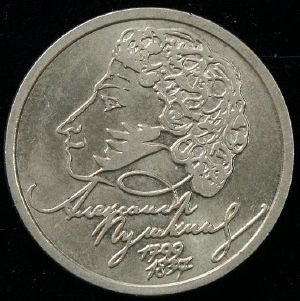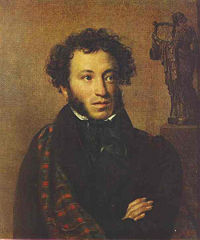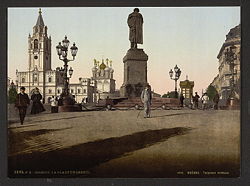Alexander Pushkin
Editing Aleksandr Pushkin From Wikipedia, the free encyclopedia. Jump to: navigation, search
- "Pushkin" redirects here.
Aleksandr Sergeyevich Pushkin (Russian: Алекса́ндр Серге́евич Пу́шкин listen ▶) (June 6 (May 26, O.S.), 1799 - February 10 (January 29, O.S.), 1837) was a Russian Romantic author whom many consider the greatest Russian poet and the founder of modern Russian literature. Pushkin pioneered the use of vernacular speech in his poems and plays, creating a style of storytelling—mixing drama, romance, and satire—associated with Russian literature ever since and greatly influencing later Russian writers.
Life
Pushkin was quite pround of his noble lineage. His father descended from one of the Russian gentry's oldest families who traced their history back to the 13th century, while his mother's grandfather was Ibrahim Petrovich Gannibal, an Abyssinian who was abducted when he was a child, ending up in Russia. He served Peter the Great as a military leader, rising to the rank of general. Peter conferred nobility upon him and a small estate. Pushkin would later write, although never finish, a novel based on the life of his grandfather—the Negro of Peter the Great.
Born in Moscow, Pushkin published his first poem at the age of fifteen. By the time he finished as part of the first graduating class of the prestigious Imperial Lyceum in Tsarskoe Selo near St. Petersburg, the Russian literary scene recognized his talent widely. After finishing school, Pushkin installed himself in the vibrant and raucous intellectual youth culture of the capital, St. Petersburg. In 1820 he was catapulted into fame with the publication of his first long poem, Ruslan and Lyudmila, despite much controversy about its subject and style.
The 1820s was an era of social unrest that culminated in the Decembrist uprising. Pushkin wrote some subversive poems that angered the government, leading to his transfer from the capital. He went first to Kishinev in 1820, where he stayed until 1823. After a summer trip to the Caucasus and to the Crimeahe wrote two Romantic poems in the mold of Byron which brought him wide acclaim, The Captive of the Caucasus and The Fountain of Bakhchisaray. In 1823 Pushkin moved to Odessa, where he again clashed with the government, which sent him into exile at his mother's rural estate in north Russia from 1824 to 1826. While he was at his mother's estate, the Decembrist Uprising (1825)occurred. In 1826 Tsar Nicholas I summoned him to Moscow and pardoned him, even though he confided to the Tsar that had he been in Saint Petersburg in 1825 he would likely have supported their cause. But some of the insurgents in the Decembrist uprising had kept some of his early political poems amongst their papers, and soon Pushkin found himself under the strict control of government censors and unable to travel or publish at will. He had written what became his most famous play, Boris Godunov, while at his mother's estate but could not gain permission to publish it until five years later.
In 1831, at the height of Pushkin's talent and influence, he met Russia's other great early literary giant, Nikolai Gogol. The two would become good friends and support one another. Gogol's comedic stories Pushkin would greatly influence in the field of prose from Gogol's comical stories. After reading Gogol's 1831-2 volume of short stories Evenings on a Farm near Dikanka, Pushkin would support him critically and later in 1836 after starting his magazine, The Contemporary, would feature some of Gogol's most famous short stories. Later, Pushkin and his wife Natalya Goncharova, whom he married in 1831, became regulars of court society. When the Tsar gave Pushkin the lowest court title, the poet became enraged: He felt this occurred not only so that his wife, who had many admirers—including the Tsar himself—could properly attend court balls, but also to humiliate him. In 1837, falling into greater and greater debt amidst rumors that his wife had started conducting a scandalous affair, Pushkin challenged her alleged lover, Georges d'Anthès, to a duel which left both men injured, Pushkin mortally. He died two days later.
The government feared a political demonstration at his funeral, which it moved to a smaller location and made open only to close relatives and friends. His body was spirited away secretly at midnight and buried on his mother's estate.
Critics consider many of his works masterpieces, such as the poem The Bronze Horseman and the drama The Stone Guest, a tale of the fall of Don Juan. Pushkin himself preferred his verse novel Eugene Onegin, which he wrote over the course of his life and which, starting a tradition of great Russian novels, follows a few central characters but varies widely in tone and focus.
Perhaps because of his political influence on generations of Russian rebels, Pushkin remained one of only a few Russian pre-Revolutionary writers who escaped condemnation by the Bolsheviks during their attacks on bourgeois literature and culture: indeed, they re-named Tsarskoe Selo after him.
Pushkin's works also provided fertile ground for Russian composers. Tchaikovsky's operas Eugene Onegin (1879) and The Queen of Spades (1890) became perhaps better known outside of Russia than Pushkin's own works of the same name, while Mussorgsky's monumental Boris Godunov (two versions, 1868-9 and 1871-2) ranks as one of the very finest and most original of Russian operas.
Works
- Ruslan i Lyudmila Ruslan and Lyudmila (1820) (poem)
- Kavkazskiy Plennik The Captive of the Caucasus (1822) (poem)
- Bakhchisarayskiy Fontan The Fountain of Bahçesaray (1824) (poem)
- Tsygany Gypsies (1827)
- Poltava (1829)
- Little Tragedies (including Kamenny Gost' "The Stone Guest", Motsart i Salieri "Mozart and Salieri", "The Miserly Knight, and "A Feast During the Plague") (1830)
- Boris Godunov (1825; publ. 1831; officially approved for perf. 1866) (drama)
- Povesti Pokoynogo Ivana Petrovicha Belkina Tales of the Late Ivan Petrovich Belkin (1831) (prose)
- The Tale of Tsar Saltan (1831) (poem)
- The Tale of the Golden Rooster (1834)
- The Tale of the Fisherman and the Fish (1835)
- Yevgeniy Onegin Eugene Onegin (1825-1832) (verse novel)
- Mednyy Vsadnik The Bronze Horseman (1833) (poem)
- Pikovaya Dama The Queen of Spades (1833)
- The History of Pugachev's Riot (1834) (prose non-fiction)
- Kapitanskaya Dochka The Captain's Daughter (1836) (prose) a romanticized historical novel of "Pugachevshchina," the life and times of Pugachev.
- Kirdzhali Kırcali (short story)
- Gavriiliada
- Istoriya Sela Goryukhina The Story of the Village of Goryukhino (unfinished)
- Stseny iz Rytsarskikh Vremen Scenes from Chivalrous Times
- Yegipetskiye Nochi Egyptian Nights (poem)
- K A.P. Kern To A.P. Kern (poem, one of the most beautiful love lyrics ever written in the Russian language)
- Bratya Razboyniki The Robber Brothers (play)
- Arap Petra Velikogo The Negro of Peter the Great (historical novel, unfinished, based on the life of his great-grandfather)
- Graf Nulin Count Nulin
- Zimniy vecher Winter evening
Biography
T.J.Binyon has written a somewhat biased English biography:
- Pushkin: a biography London: HarperCollins, 2002. ISBN 0-00-215084-0 (US edition: New York: Knopf, 2003 ISBN 1-4000-4110-4)
Hoaxes and other attributed works
In the late 1980s, a book entitled "Secret Journal 1836-1837" was published by a Minneapolis publishing house, claiming to be the decoded content of an encrypted private journal kept by Pushkin. Promoted with little details about its contents, and touted for many years as being 'banned in Russia', it was an erotic novel narrated from Pushkin's perspective. Some mail-order publishers still carry the work under its fictional description.
See also
- Pushkin Prize
ReferencesISBN links support NWE through referral fees
- Elaine Feinstein (ed.): After Pushkin: versions of the poems of Alexander Sergeevich Pushkin by contemporary poets. Manchester: Carcanet Prees; London: Folio Society, 1999 ISBN 1-57544-44-7
- Serena Vitale: Pushkin's button; transl. from the Italian by Ann Goldstein. New York: Farrar, Straus & Giroux, 1998 ISBN 0-374-23995-5
External links
- Complete works (in Russian) — FEB-web's Digital Scholarly Edition (DSE) of A.S. Pushkin
- Complete works in ten volumes. (In Russian)] From the Russian Virtual Library.
- Works by Pushkin from Project Gutenberg
- The family history of Aleksandr Pushkin
- Hoax Pushkin diary : www.mipco.com/english/push.html
bg:Александър Сергеевич Пушкин cs:Alexandr Sergejevič Puškin da:Aleksandr Sergejevitj Pusjkin de:Alexander Sergejewitsch Puschkin es:Alejandro Pushkin eo:Aleksandr PUŜKIN fr:Alexandre Pouchkine hr:Aleksandar Sergejevič Puškin he:אלכסנדר פושקין ka:პუშკინი, ალექსანდრე nl:Aleksandr Poesjkin ja:アレクサンドル・プーシキン pl:Aleksander Puszkin pt:Alexandre S. Pushkin ru:Пушкин, Александр Сергеевич sh:Aleksandar Sergejevič Puškin sk:Alexander Sergejevič Puškin sl:Aleksander Sergejevič Puškin sr:Александар Сергејевич Пушкин fi:Aleksandr Puškin sv:Aleksandr Pusjkin tr:Aleksandr Sergeyeviç Puşkin zh:亚历山大·普希金
Edit summary:
Cancel | Editing help (opens in new window)
Templates used on this page: Template:Audio Template:Redirect Insert: Á á É é Í í Ó ó Ú ú À à È è Ì ì Ò ò Ù ù  â Ê ê Î î Ô ô Û û Ä ä Ë ë Ï ï Ö ö Ü ü ß Ã ã Ñ ñ Õ õ Ç ç Ģ ģ Ķ ķ Ļ ļ Ņ ņ Ŗ ŗ Ş ş Ţ ţ Ć ć Ĺ ĺ Ń ń Ŕ ŕ Ś ś Ý ý Ź ź Đ đ Ů ů Č č Ď ď Ľ ľ Ň ň Ř ř Š š Ť ť Ž ž Ǎ ǎ Ě ě Ǐ ǐ Ǒ ǒ Ǔ ǔ Ā ā Ē ē Ī ī Ō ō Ū ū ǖ ǘ ǚ ǜ Ĉ ĉ Ĝ ĝ Ĥ ĥ Ĵ ĵ Ŝ ŝ Ŵ ŵ Ŷ ŷ Ă ă Ğ ğ Ŭ ŭ Ċ ċ Ė ė Ġ ġ İ ı Ż ż Ą ą Ę ę Į į Ų ų Ł ł Ő ő Ű ű Ŀ ŀ Ħ ħ Ð ð Þ þ Œ œ Æ æ Ø ø Å å Ə ə – — … [] [[]] {{}} ~ | ° § → ≈ ± − × ¹ ² ³ ‘ “ ’ ” £ € Α α Β β Γ γ Δ δ Ε ε Ζ ζ Η η Θ θ Ι ι Κ κ Λ λ Μ μ Ν ν Ξ ξ Ο ο Π π Ρ ρ Σ σ ς Τ τ Υ υ Φ φ Χ χ Ψ ψ Ω ω
Your changes will be visible immediately. For testing, please use the sandbox. You're encouraged to create and improve articles. The community is quick to enforce the quality standards on every article you edit. Please cite your sources so others can check your work. On discussion pages, please sign your comment by typing four tildes (David Burgess 00:49, 6 November 2005 (UTC)).
DO NOT SUBMIT COPYRIGHTED WORK WITHOUT PERMISSION All edits are released under the GFDL (see WP:Copyrights). If you don't want your writing to be edited and redistributed by others, do not submit it. Only public domain resources can be copied exactly—this does not include most web pages.
Retrieved from "http://en.wikipedia.org/wiki/Aleksandr_Pushkin" ViewsArticleDiscussionEdit this pageHistory Personal toolsCreate account / log in Navigation Main PageCommunity PortalCurrent eventsRecent changesRandom articleHelpContact usDonations Search
Toolbox
What links here Related changes Upload file Special pages
This version of the article has been revised. Besides normal editing, the reason for revision may have been that this version contains factual inaccuracies, vandalism, or material not compatible with the GFDL. About Wikipedia Disclaimers
Credits
New World Encyclopedia writers and editors rewrote and completed the Wikipedia article in accordance with New World Encyclopedia standards. This article abides by terms of the Creative Commons CC-by-sa 3.0 License (CC-by-sa), which may be used and disseminated with proper attribution. Credit is due under the terms of this license that can reference both the New World Encyclopedia contributors and the selfless volunteer contributors of the Wikimedia Foundation. To cite this article click here for a list of acceptable citing formats.The history of earlier contributions by wikipedians is accessible to researchers here:
The history of this article since it was imported to New World Encyclopedia:
Note: Some restrictions may apply to use of individual images which are separately licensed.


